
A wheel is a circular component that is intended to rotate on an axle bearing. The wheel is one of the key components of the wheel and axle which is one of the six simple machines. Wheels, in conjunction with axles, allow heavy objects to be moved easily facilitating movement or transportation while supporting a load, or performing labor in machines. Wheels are also used for other purposes, such as a ship's wheel, steering wheel, potter's wheel, and flywheel.

AB SKF is a Swedish bearing and seal manufacturing company founded in Gothenburg, Sweden, in 1907. The company manufactures and supplies bearings, seals, lubrication and lubrication systems, maintenance products, mechatronics products, power transmission products, condition monitoring systems and related services globally.
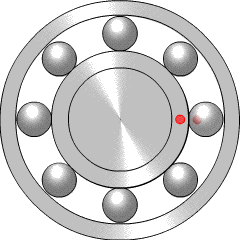
A ball bearing is a type of rolling-element bearing that uses balls to maintain the separation between the bearing races.
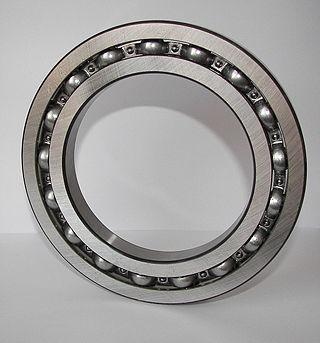
A bearing is a machine element that constrains relative motion to only the desired motion and reduces friction between moving parts. The design of the bearing may, for example, provide for free linear movement of the moving part or for free rotation around a fixed axis; or, it may prevent a motion by controlling the vectors of normal forces that bear on the moving parts. Most bearings facilitate the desired motion by minimizing friction. Bearings are classified broadly according to the type of operation, the motions allowed, or the directions of the loads (forces) applied to the parts.

In mechanical engineering, a rolling-element bearing, also known as a rolling bearing, is a bearing which carries a load by placing rolling elements between two concentric, grooved rings called races. The relative motion of the races causes the rolling elements to roll with very little rolling resistance and with little sliding.
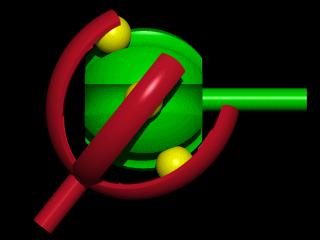
A constant-velocity joint is a mechanical coupling which allows the shafts to rotate freely and compensates for the angle between the two shafts, within a certain range, to maintain the same velocity.

A thrust bearing is a particular type of rotary bearing. Like other bearings they permanently rotate between parts, but they are designed to support a predominantly axial load.

In horology, a tourbillon is an addition to the mechanics of a watch escapement to increase accuracy. Conceived by the British watchmaker and inventor John Arnold, it was developed by his friend the Swiss-French watchmaker Abraham-Louis Breguet and patented by Breguet on 26 June 1801. In a tourbillon the escapement and balance wheel are mounted in a rotating cage, with the goal of eliminating errors of poise in the balance giving a uniform weight.

A hot box is the term used when an axle bearing overheats on a piece of railway rolling stock. The term is derived from the journal-bearing trucks used before the mid-20th century. The axle bearings were housed in a box that used oil-soaked rags or cotton to reduce the friction of the axle against the truck frame. When the oil leaked or dried out, the bearings overheated, often starting a fire that could destroy the entire railroad car if not detected early enough.

Tapered roller bearings are rolling element bearings that can support axial forces as well as radial forces.

A needle roller bearing is a special type of roller bearing which uses long, thin cylindrical rollers resembling needles. Ordinary roller bearings' rollers are only slightly longer than their diameter, but needle bearings typically have rollers that are at least four times longer than their diameter. Like all bearings, they are used to reduce the friction of a rotating surface.
A linear-motion bearing or linear slide is a bearing designed to provide free motion in one direction. There are many different types of linear motion bearings.
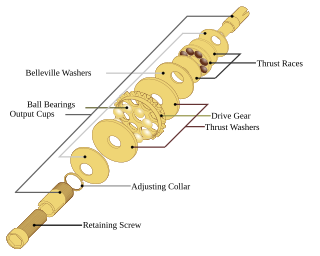
A ball differential is a type of differential typically used on radio-controlled cars. It differs from a geared differential by using several small ball bearings rotating between two plates, instead of bevel gears.

A spherical bearing is a bearing that permits rotation about a central point in two orthogonal directions. Typically these bearings support a rotating shaft in the bore of the inner ring that must move not only rotationally, but also at an angle. It can either be a plain bearing or roller bearing.

Rolamite is a technology for very low friction bearings developed by Sandia National Laboratories in the 1960s. It is the only elementary machine discovered in the twentieth century and can be used in various ways such as a component in switches, thermostats, valves, pumps, and clutches, among others.
This is a list of High Sheriffs of Carmarthenshire. Carmarthenshire was originally created by the Statute of Rhuddlan in 1284. It became an administrative county in 1889 with a county council following the Local Government Act 1888. Under the Local Government Act 1972, the administrative county of Carmarthenshire was abolished on 1 April 1974 and the area of Carmarthenshire became three districts within the new county of Dyfed : Carmarthen, Dinefwr and Llanelli. Under the Local Government (Wales) Act 1994, Dyfed was abolished on 1 April 1996 and the three districts united to form a unitary authority which had the same boundaries as the original Carmarthenshire but remaining in the shrievalty of Dyfed.
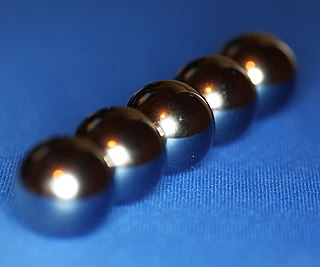
Bearing balls are special highly spherical and smooth balls, most commonly used in ball bearings, but also used as components in things like freewheel mechanisms. The balls come in many different grades. These grades are defined by bodies such as the American Bearing Manufacturers Association (ABMA), a body which sets standards for the precision of bearing balls. They are manufactured in machines designed specially for the job.
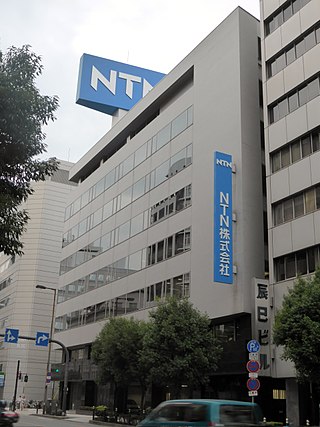
NTN Corporation is one of the most prominent manufacturers of bearings in Japan, second domestically only to NSK Ltd. The company is one of the largest exporters worldwide of friction-reducing products such as constant-velocity joints.

Hyatt Roller Bearing Company was a manufacturer of roller bearings from 1892 to 1916, when it was acquired by General Motors. It continued as a distinct division of GM for many years. The company struggled at first, then entered a phase of profitable growth under the leadership of Alfred P. Sloan. The innovative design of Hyatt's roller bearings made them more durable and efficient than others. They were widely used in early automobiles by various manufacturers, and in industrial vehicles and equipment.
Lewis Rasmus Heim was an American machinist and businessman who was the inventor of the Centerless Cylindrical Grinder, the Heim Joint Rod End Bearing and a pioneer of modern spherical, ball and roller bearings.

















